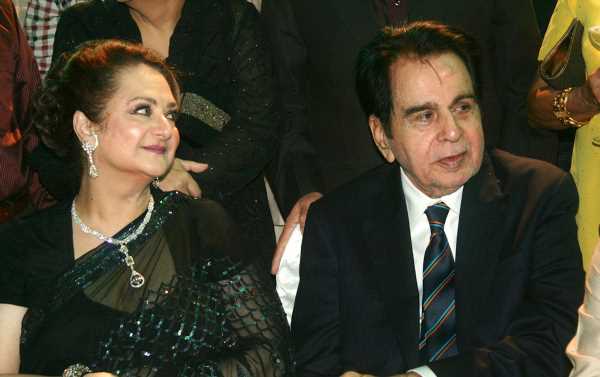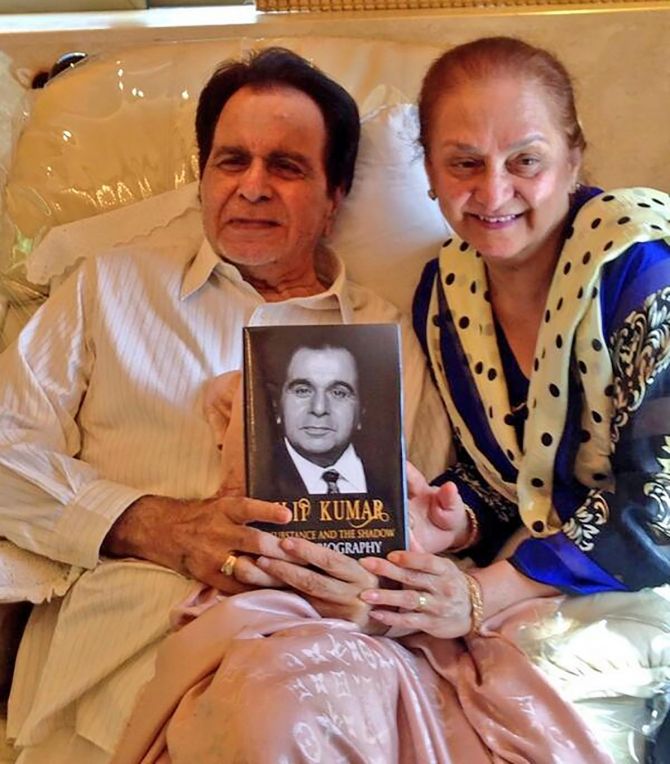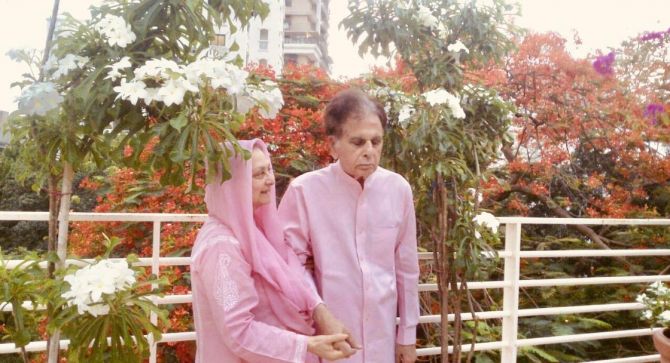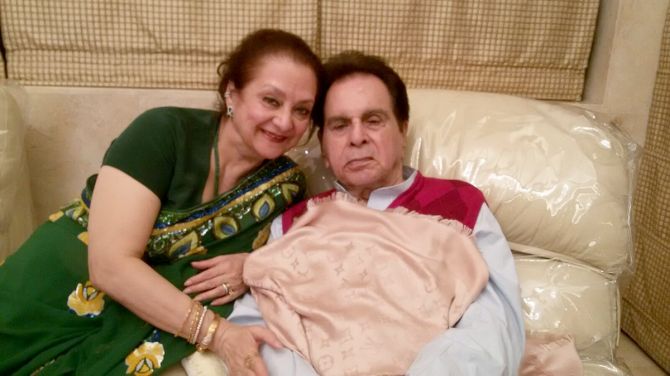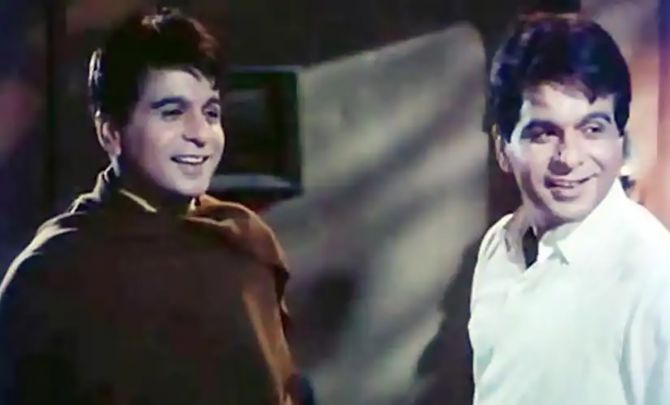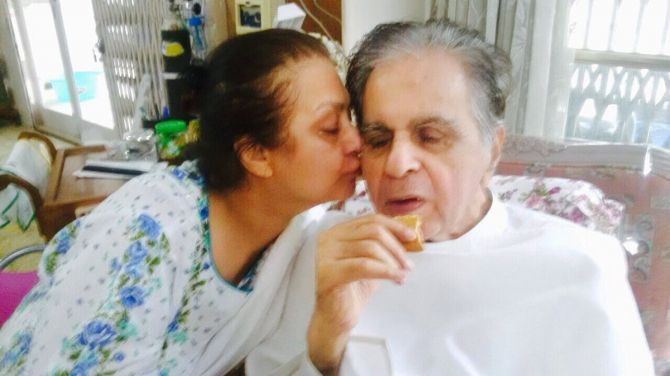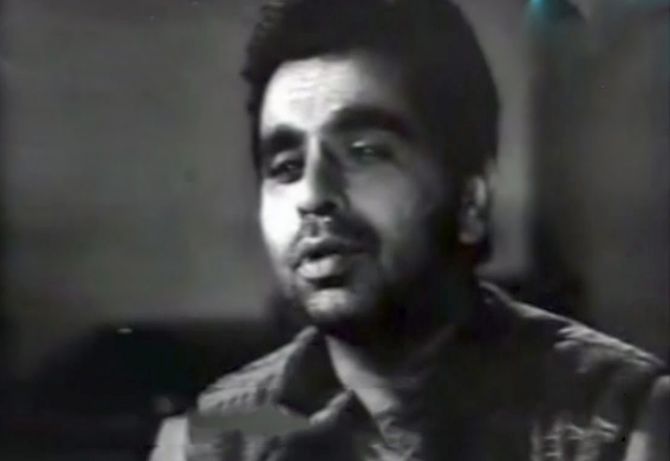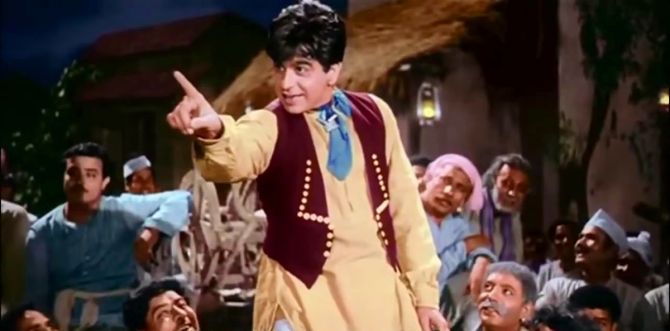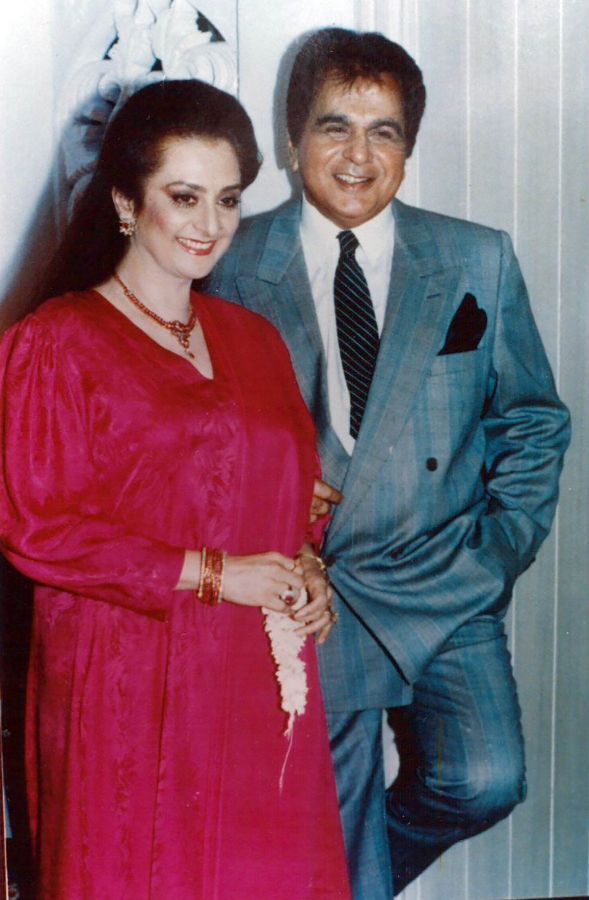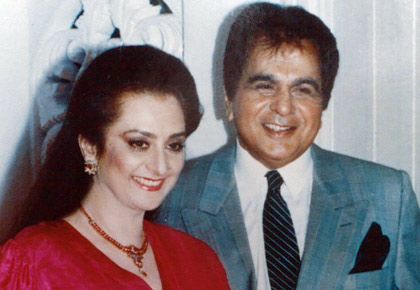‘So I started talking to him in Marathi and everything really changed.’
‘There was this spark in his eyes and he smiled.’
‘It’s unbelievable that a man can be so charming with a single smile at 90.’
It’s very easy to fall in love with Dilip Kumar, and Ashish Amrute learnt that first-hand.
An associate editor on films like Dabangg 2, Tanu Weds Manu and Pyaar Ke Side Effects, Ashish got a rare opportunity to work on a short film on Dilip Kumar during the launch of the star’s autobiography, Dilip Kumar: The Substance and the Shadow.
Ashish spent a month-and-a-half at the legendary actor’s Pali Hill bungalow, working on the short film.
And he became a fanboy.
He tells Patcy N/Rediff.com, “On the third day of working on the film, I met Dilipsaab. By then, he was already suffering from Alzheimer’s. He would not meet outsiders unless there was a need. We went to his room, and I was not sure how to react. I was 35-40 and he was a superstar…”
“I met Dilip Kumar in 2014, just before his autobiography, Dilip Kumar: The Substance and the Shadow, released. They wanted to make a documentary which we could play at the book launch but since we were pressed for time, we made a short film.
I spent 45 days at his residence to work on the film.
I would go in the afternoon and leave late in the evening or at night and that is how I got to know him, Sairaji and the whole family.
When I was growing up, my dad was a huge fan of Raj Kapoor and Dilip Kumar. I had heard so much about both of them that I was keen to see the man himself.
On the third day of working on the film, I met Dilipsaab.
By then, he was already suffering from Alzheimer’s. He would not meet outsiders unless there was a need.
We went to his room, and I was not sure how to react.
I was 35-40 and he was a superstar…”
“Sairaji knew I was a Maharashtrian, so she asked me to speak in Marathi, as he understood and spoke the language very well.
From the footage I had seen, I knew that he had a lot of Maharashtrian friends from his younger days. He had a special corner in his heart for the time he had spent in Deolali with his friends.
So I started talking to him in Marathi and everything really changed.
There was this spark in his eyes and he smiled.
That floored me.
I thought I was looking at the most handsome man in the world!
It’s unbelievable that a man can be so charming with a single smile at 90.
After that, meeting him became routine. Every evening, I would take a break and that was also the time for his walk in their huge garden.
Dilipsaab stayed on the second floor of their house. Once, after a week or so, when he came down with his attendant, something happened and the attendant had to go back. He needed someone to hold Dilipsaab‘s hand.
Due to Alzheimer’s, he didn’t recognise too many people, so he would not hold a stranger’s hand. But I was meeting him almost everyday for a week, so he allowed me to hold his hand.
He had a firm grip.
Then it became a habit. Every second or third day, we would do it.”
“When we decided to work on the short film, we could have used Dilipsaab‘s footage that was publicly available.
But I wanted something unique because his autobiography was going to release on his 91st birthday (it was later postponed to June 2014).
Sairaji had more than 100 hours footage from Dilipsaab‘s life.
She had preserved all the interesting moments on film.
Somebody would always record whatever was happening at the house — events, functions, interviews… — and that was converted in the digital format.
We decided to use that footage.
Every day, I would watch some footage and Sairaji would talk about it.
I learnt that he was a fine singer, he could play the dholak and the saxophone and he would play them at his house parties.
He was fond of children.
During parties, he would have fun with his family and blend in with them. He would fool around with children but turn into a philosopher and mesmerise the adults.
Sairaji once told me a saint had told Dilipsaab‘s mother that this boy would become very famous someday but the first 10-12 years of his life would be difficult. So to ward off evil, she had to shave his head and put a kaala theeka.
Dilipsaab was a fine sportsman, and at one particular point in his youth, he almost considered a career in athletics.
His first shot for a film had something to do with a heroine who was trying to commit suicide and he had to run and save her.
He ran as fast as he could, but the director asked him to slow down because it would look too fast on camera.
This happened a couple of times and the director kept asking him to reduce his speed.
After three or four takes, he realised that this was something technical. Even if he runs moderately fast on screen, it would look very fast on screen.
So with that first scene itself, he realised that this medium was more than just reality. You cannot behave the way you would normally, there’s a certain technicality associated with it.
With that, he began to take a keen interest in knowing those technicalities of cinema.
He was very keen on knowing what lenses were being used or where he should look.
He was a perfectionist.
While shooting for Ram Aur Shyam, in one scene, he had to look exhausted because he’d been running for 10 km.
They were shooting on a plateau, so he decided to take a run and for one hour he ran continuously to look exhausted.
Sairaji says Dilipsaab‘s biggest fan was Dharmendra.
She would say that Dharmpaaji was so much in love with Dilipsaab that he would turn up in the middle of the night just to hug Dilipsaab. And Dilipsaab would never object to that.
There was a vintage Mercedes parked at his home and once, I asked Sairaji about it.
She said Dilipsaab used to take a ride around the city in that particular car.
He loved long drives, so Sairaji would take him around in the car and that’s why the car was well maintained.
If you go to his house, there are portions which he used to love and they are still maintained like that to make him feel comfortable.
The way Sairaji looked after his health was unbelievable.
A doctor would visit him every day for a routine check-up.
Although Dilipsaab was suffering with Alzheimer’s, Sairaji would always talk to him.
She was there for him 24×7.
The entire household routine was centered around him.
He loved his chair so on the book release, that chair was transported from his house to the hotel where the book was launched.
When I started working there, I started watching Dilipsaab‘s films and listening to Sairaji, I understood him.
She told me how he was advised to do a light-hearted film because he had gained the popularity of being a Tragedy King.
The films he was doing were emotionally draining him and he was on the verge of depression. He was medically advised to stay away from those films.
Sairaji and his family would be worried about how to convince him to do light-hearted film because he was so much into serious cinema.
My respect and love for Dilipsaab increased after working on that film.
I learnt how Vyjayantimala guided him to dance in the famous song Ude Jab Jab Zulfein Teri from Naya Daur — Dilipsaab was reluctant about dancing. He was very apprehensive about the idea, especially dancing opposite someone as talented as Vyjayantimala.
So she gave him the steps and helped him dance correctly.
He would take everything seriously.
There was a particular scene in Kohinoor in which he had to play the sitar. So he practiced for three months.
He wanted to make sure that his hand movements were correct.
He liked classical music. He sang very well.
In fact, he sang a song called Lagi Nahi Chhute with Lata Mangeshkar in the film Musafir.
He was a fantastic mimic. His observation skills were top notch.
Like how Raj Kapoor’s Holi parties were famous, Dilipsaab‘s anniversary and birthday parties were special, and the entire industry would show up.
There is a 10-hour wedding footage which I got to see.
Sairaji looked so beautiful in it simply because she was so much in love.
She believes she was born to fall in love with Dilipsaab, but she never thought she would actually marry him.
So on the wedding day, she just couldn’t take her eyes off him.
When I met her, she had said, when Dilipsaab was around, nothing else mattered to her.
- Goodbye Dilipsaab
Source: Read Full Article
